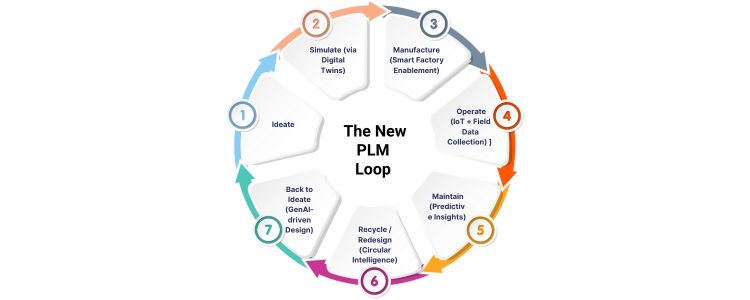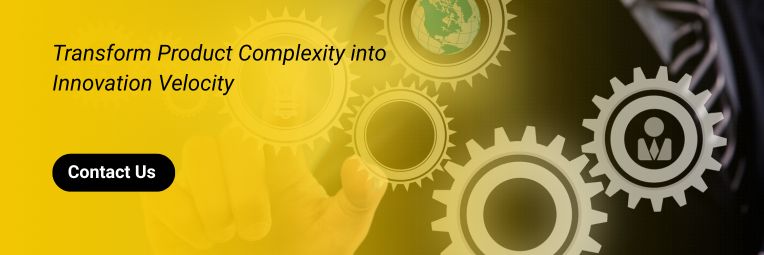
The world of product life cycle management (PLM) is entering a new and adventurous era. Since global companies are facing the low lifetime of products, growing customer expectations and regulatory pressures, the passive approach towards PLM is no longer durable. From connected devices to circular design, every product now produces data, insight and re-explanation opportunities. The global center of digital change, India, is leading this change. More than 1,950 active GCCs are employed by 1.9 million people (NASSCOM, 2024). India’s knowledge centers are developing as a strategic command center for smart product life cycle management. According to a report, 60% of global companies are expanding PLM outsourcing solutions to manage complexity, reduce costs and innovate. With India’s talent base, cost profit and technical infrastructure, the global capability centers (GCC) in India are redefining the future of PLM systems.
Meet the product lifestyle director, Anika Rao, at a GCC in Bangalore, who oversees PLM change for a major Nordic electronics firm. Every morning, Anika reviews real-time data obtained from smart devices from five countries, runs predicted simulations on materials for cost and compliance, and integrates GenAI tools to suggest improvement in design. On the other hand, the Chief Innovation Officer of a German Automotive Leader, Thomas Berg, along with his GCC in India, runs a digital thread orchestration so that they can track every component from design to reuse. These personalities are no longer imaginary. These indicate how GCCs are becoming important partners in digital transformation in PLM – which is making fast decision-making, sustainable design and data-operated product strategy possible.
The traditional PLM was linear: from the concept to the end. Today, it is a closed-loop system powered by real-time figures and interfunctional cooperation. How the GCCs in India are changing at each stage is mentioned here:
PLM trends in 2025 supported by GCC:
GCCs are not only distribution centers; these centers integrate design, data and decision-making. Below is a wide table that indicates how GCC is bringing revolution in each PLM impact area with high-demonstration innovation and real-time adaptability. This change provides concrete results: arriving rapidly in the market, reducing engineering costs up to 30%, and better coordination with ESG goals, making GCC’s PLM systems indispensable for the future of systems.
PLM is growing as a modular, API-operated ecosystem. Instead of investing in unbroken PLM devices, global enterprises are adopting PLM as a service (PLMaaS) to enable rapid rollouts, uninterrupted integration and measurement on demand. Indo-based GCCs are playing a leading role in providing industry-infused PLM stacks by combining cloud-element architecture, digital thread competence and AI analytics to provide integrated life cycle visibility. Companies are integrating the PLM with ERP, MES and CRM platforms through microservice-based PLM layers, which is speeding up the achievement of insight into all tasks. With GenAI tools, teams can now simulate the use patterns, estimate breakdown, and life cycle and actively give new appearances to products to improve ROI. By 2027, the rate of adoption of PLMaaS globally is expected to increase by 31% CAGR and India is emerging as a preferred distribution center for scalable PLM services due to its intensity in engineering, data science and cloud operations.
PLM outsourcing solutions are no longer about cost adaptation; they are about engineering value. GCC in India, with its field expertise and technical depth, is at the forefront of life-smart product lifecycle management. Whether you are a manufacturing legend, a healthcare intellectual, or a consumer electronics leader, the future of PLM systems lies in global capability centers that are faster than the market and that are adapted and developed.
Prepare your product life-cycle management for future innovation with Inductus GCC to convert data-powered engines. We create safe, scalable and domain-specific GCC in India that speeds up every stage of PLM, from digital thread integration and circular design to real-time analytics and regulatory compliance. With intensive expertise in GenAI, Digital Twins and Cloud-Environment PLM platforms, our tight delivery teams enable the market to arrive faster and make better product decisions.
PLM refers to the strategic process of managing the entire life cycle of a product—from ideas, design and construction to service and disposal. Today’s smart PLM systems integrate AI, IOT and stability to promote innovation and efficiency. Benefits include 25-30% cost profit, engineering and AI access to expert talent, rapid access to market, 24/7 operations, and inherent compliance for global markets. Major PLM trends in 2025 include PLM as a Service (PLMaaS), Digital Twin Simulation, Circular Economy Integration, Genai in Product Design Genai and End-to-And Sustainability Analytic. Yes, SMEs can avail flexible PLM outsourcing models through GCC to reach top-level technology and domain expertise without investing in heavy infrastructure. India is becoming a global destination for the next generation of PLM solutions through GCC, with huge reserves of engineering talent, maturity of digital change, and cost-skilled innovation ecological systems. Aditi, with a strong background in forensic science and biotechnology, brings an innovative scientific perspective to her work. Her expertise spans research, analytics, and strategic advisory in consulting and GCC environments. She has published numerous research papers and articles. A versatile writer in both technical and creative domains, Aditi excels at translating complex subjects into compelling insights. Which she aligns seamlessly with consulting, advisory domain, and GCC operations. Her ability to bridge science, business, and storytelling positions her as a strategic thinker who can drive data-informed decision-making.
Personality Lens: Who is reinforcing PLM today?
How GCC is Giving a New Look to The PLM Life Cycle

Strategic Changes Supported By GCC
PLM Impact Area
Traditional Approach
GCC-Led Transformation
Product Ideation
Based on intuition and historical data, siloed R&D environments
AI/ML-based idea generation, consumer trend mining, and global co-innovation across time zones
Design & Simulation
Sequential CAD iterations with long approval cycles
Real-time design simulations using digital twins; accelerated iteration using cloud-based collaboration tools
Cost & Compliance
Manual compliance tracking and post-design cost control
Embedded cost estimation models; auto-updated digital compliance rules across geographies
Sustainability
Considered post-production; reactive carbon audits
Lifecycle-based design with embedded carbon footprint calculators, material recyclability insights
Product Servitization
Minimal support after product delivery
Integration of IoT data to offer product-as-a-service models; predictive support and monetization frameworks
Reusability & Circularity
Products retired without reuse strategies
IoT and telemetry data feed into redesign for reuse; product components are mapped for extended life cycles.
PLM-As-A-Service Rise
Conclusion
frequently asked questions (FAQs)

Aditi
Hey, like this? Why not share it with a buddy?
Related Posts
Recent Blog / Post
- Agile Methodologies for GCCs: A Blueprint for Success October 6, 2025
- The Legal and Compliance Checklist for a New GCC Setup October 4, 2025
- The Rise of Niche GCCs: A Focus on Specialised Capabilities October 4, 2025
- The Impact of Regulatory Changes on GCC Operations October 4, 2025
- Cybersecurity for GCCs: A Proactive Approach to Data Protection September 30, 2025
- Beyond Cost: Measuring the True ROI of Your GCC Investment September 29, 2025
- The Future of GCCs in the Retail Sector: A Strategic Playbook September 29, 2025
- David vs Goliath: Mid-Sized GCCs Quietly Outperform the Big Brands September 29, 2025
- Infineon’s Big Bet on India: Inside Its First GCC in GIFT City September 29, 2025
- From Campuses to Capability Centres: How Indian Universities Power the Global GCC Ecosystem September 29, 2025
- Retail Meets Digital: Costco’s GCC in Hyderabad Marks a Global Shift September 29, 2025
- The Silent Crisis: Why Many GCCs Plateau After 3 Years and How to Avoid It September 24, 2025
- Germany’s New Skilled Immigration Act and Its Ripple Effect on the GCC Talent Model September 24, 2025
- From Tokyo to Hyderabad: The Future of GCCs for Japanese Conglomerates September 23, 2025
- GCCs as AI Acceleration Hubs: Collaborating with US and Nordic Tech Majors September 19, 2025
















